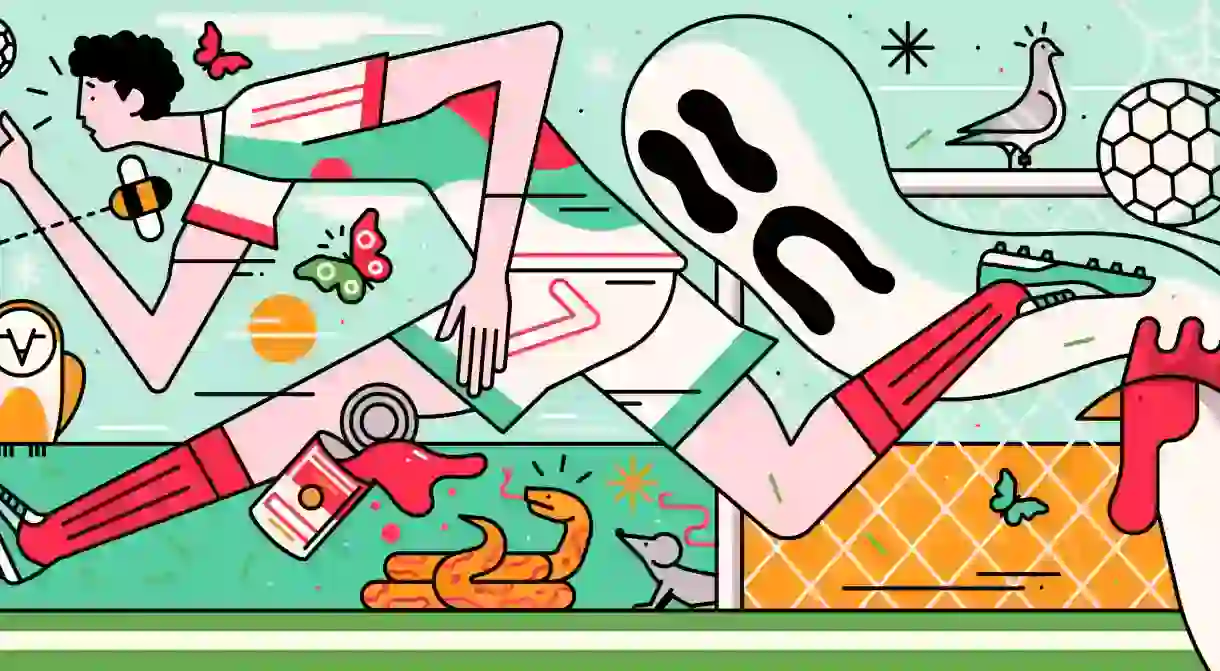15 Incredible Football Phrases From Around the World

In Tom Williams’ brilliant new book Do You Speak Football?, he presents a glossary of phrases, words and expressions from around the globe that are used on the football pitch. So, while people often refer to football as the world’s language, this offering from Williams highlights the quirks and intricacies that make it far more nuanced than that.
Hacer la cama – “To make the bed” (Argentina)
If players in Argentina are said to be contributing to getting their manager the boot, they are “making the bed”, readying him for lights out and time to say “goodnight”.

Shireitō (管制塔) – “Control tower” (Japan)
A player, usually a midfielder, who is the playmaker of the team and dictating proceedings is given the same attributes as a flight controller’s workplace.

Onde dorme a coruja – “Where the owl sleeps” (Brazil)
A goal that lands in the top corner could be referred to by all sorts of terms depending on where in the world you are. The USA call it the “upper 90”, for example, but in Brazil it’s where the owl sleeps.

Lanzo una nevera – “To launch a fridge” (Venezuela)
This South American country has two terms for a pass that is hit too hard. If a teammate fires an uncontrollable ball at you, they’re either “chucking a brick” or “launching a fridge”.

Chocoladebeen – “Chocolate leg” (Netherlands)
For the Dutch, shooting or passing with your weaker foot means using a leg made completely of chocolate.

Lepkevadász – “Butterfly hunter” (Hungary)
Any goalkeeper in Hungary who can’t catch high balls and flaps at crosses is said to be on the hunt for butterflies in the sky.

Ratonera – “Mouse nest” (Argentina)
Just like the more satisfying top corner, the world’s game has given a great many names to goals fired into it’s less glamorous cousin. In Argentina, drilling it into the bottom corner means disrupting a mouse’s nest.

Yau Gwai (有鬼) – “There’s a ghost” (China)
While in England, teammates or fans shout “man on!” when an opponent is approaching a player in possession (usually from behind), this Cantonese term, however, gives the opponent a more ghoulish feel.

Minestra riscaldata – “Reheated soup” (Italy)
When a team hires a manager they’ve employed before, something that happens frequently and repeatedly in Italy, a club’s hierarchy is dipping into leftovers and sticking them in the microwave.

Curi ayam – “Stealing chicken” (Malaysia)
Strikers who hang on the shoulder of the last defender, regularly flirting with the offside flag are, in Malaysia at least, stealing chicken. Pippo Inzaghi’s pockets must have been jam packed with poultry.

Bal yapmayan arı – “Bee without honey” (Turkey)
A bee without honey is any Turkish player who works hard, runs around a lot, looks busy, but all with very little to show for it, and with very little end product.

Layastad Al-hamaam (ليصطاد الحمام) – “To hunt pigeons” (Saudi Arabia)
In Saudi Arabia, firing over the bar is beautifully referred to by this phrase, with a wayward striker’s aim fixed on pigeons in the sky, rather than the back of the net.

Geomi-son (거미 손) – “Spider hands” (South Korea)
When a goalkeeper is just having one of those days, where every cross is claimed and every shot is saved, South Koreans evoke the multi-limbed and sticky sense of spiders to explain it all.

Kukanyaga nyoka – “To step on a snake” (Kenya)
What the English simply know as an “air shot” is given far more flavour by Kenyans. This Swahili expression refers to players who shoot and miss the ball completely, blaming it on serpents in the grass instead of any bad timing.

Ficar na mama – “Stay at the teat” (Portugal)
This brilliant expression is aimed at any striker who doesn’t leave the penalty box through fear of missing out on a goalscoring opportunity.


DO YOU SPEAK FOOTBALL?
by Tom Williams
Bloomsbury Sport (UK)
£10.82
SaveSave
SaveSave













